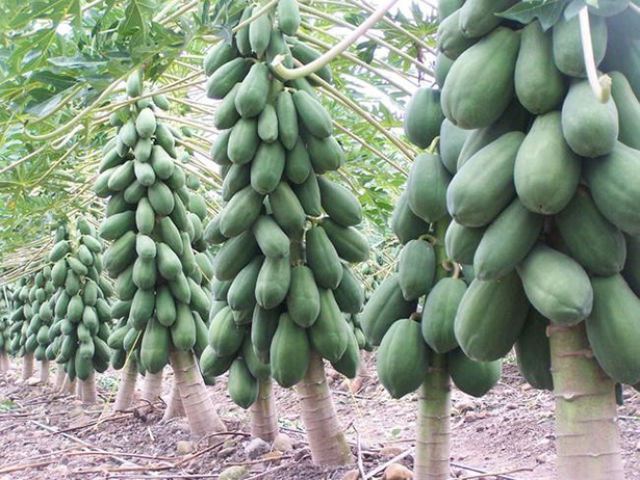Genetically Engineered Food

Many of the papayas that make their way to the US are genetically modified to be ringspot virus-resistant. While we don’t fully know the effect of genetically engineered foods on humans, many European countries are against it because of the effect on animals.
Found in: Papayas, corn, and many other crops.
Health Hazards: Animals fed GE foods have suffered intestinal and organ damage, tumors, birth defects, premature death and sterility by the third generation.
Banned in: Austria, France, Germany, Greece, Hungary and Luxembourg.
1.
nefus 11 year s ago
Omg the european union is so wise. Let's get rid of caffeine because it's a poison too. Apple seeds contain cyanide. OMG lets start a whiney panic. *sigh*
6.

Fats-T 11 year s ago
Most of these things are in food you should be eating less of anyway. Hamburgers, hotdogs, chips, sugary drinks, white bread, etc.
7.
Thingy 11 year s ago
#2 "cartlidge". Fucking CARTLIDGE? They put Chinese printer ink in food?
Complete spelling fail :(
Complete spelling fail :(
8.
debbie.young.3910829 11 year s ago
Regarding the safety of carrageenan, there has been an amazing amount of misinformation being blogged about carrageenan being unsafe as a food ingredient. In spite of this misinformation, carrageenan continues as the safe food ingredient it has always been. If it were not, the principal regulatory agencies of the world (US FDA, FAO/WHO JECFA, EU EFSA, and Japan Ministry of Health) would not approve its use, and all of them give the necessary approvals. The only application restricted as a precautionary measure is stabilizing liquid infant formula and a definitive toxicology is about to be published that is expected to remove this restriction.
Why all the concern about the safety of using carrageenan in foods? Starting in the 1960s there have been research studies showing that if excessive doses of carrageenan are consumed in animal trials inflammation can be induced in the small intestine. Likewise, inappropriate methods of introducing the carrageenan into the animals, i.e. in the animals’ only source of drinking water, have induced an inflammatory response in the small intestine. However, there has never been a validated inflammatory response in humans over the seventy plus years carrageenan has been used in foods. The anecdotal “upset tummies” reported in blogs as coming from consuming a food containing carrageenan are hardly
reliable sources of information on the safety of carrageenan.
Inflammatory responses in animals only occur when carrageenan can cross the blood membrane barrier of the small intestine. This only occurs when the extreme feeding conditions mentioned above are employed. Normal feeding regimes induce no such response.
Over the last decade a group of molecular biologists at the University of Illinois at Chicago lead by Dr Joanne Tobacman have been exploring the in vitro interaction of carrageenan with various genes and conclude that carrageenan can cause inflammation in the gut via a binding mechanism involving TLR-4 receptors. This group also concluded that carrageenan degrades in the gut and the degraded carrageenan can permeate the membrane barrier. Recent studies refute both of these claims, and furthermore this recent research questions the validity using in vitro studies to mimic the in vivo events in the GI tract when a human consumes a food containing carrageenan.
The bottom line on the safety issue is that in spite of all the efforts to downgrade or question the safety of carrageenan, particularly by bloggers, carrageenan is a safe food ingredient in all of the major regulatory jurisdictions of the world.
Why all the concern about the safety of using carrageenan in foods? Starting in the 1960s there have been research studies showing that if excessive doses of carrageenan are consumed in animal trials inflammation can be induced in the small intestine. Likewise, inappropriate methods of introducing the carrageenan into the animals, i.e. in the animals’ only source of drinking water, have induced an inflammatory response in the small intestine. However, there has never been a validated inflammatory response in humans over the seventy plus years carrageenan has been used in foods. The anecdotal “upset tummies” reported in blogs as coming from consuming a food containing carrageenan are hardly
reliable sources of information on the safety of carrageenan.
Inflammatory responses in animals only occur when carrageenan can cross the blood membrane barrier of the small intestine. This only occurs when the extreme feeding conditions mentioned above are employed. Normal feeding regimes induce no such response.
Over the last decade a group of molecular biologists at the University of Illinois at Chicago lead by Dr Joanne Tobacman have been exploring the in vitro interaction of carrageenan with various genes and conclude that carrageenan can cause inflammation in the gut via a binding mechanism involving TLR-4 receptors. This group also concluded that carrageenan degrades in the gut and the degraded carrageenan can permeate the membrane barrier. Recent studies refute both of these claims, and furthermore this recent research questions the validity using in vitro studies to mimic the in vivo events in the GI tract when a human consumes a food containing carrageenan.
The bottom line on the safety issue is that in spite of all the efforts to downgrade or question the safety of carrageenan, particularly by bloggers, carrageenan is a safe food ingredient in all of the major regulatory jurisdictions of the world.



Complete spelling fail :(
Why all the concern about the safety of using carrageenan in foods? Starting in the 1960s there have been research studies showing that if excessive doses of carrageenan are consumed in animal trials inflammation can be induced in the small intestine. Likewise, inappropriate methods of introducing the carrageenan into the animals, i.e. in the animals’ only source of drinking water, have induced an inflammatory response in the small intestine. However, there has never been a validated inflammatory response in humans over the seventy plus years carrageenan has been used in foods. The anecdotal “upset tummies” reported in blogs as coming from consuming a food containing carrageenan are hardly
reliable sources of information on the safety of carrageenan.
Inflammatory responses in animals only occur when carrageenan can cross the blood membrane barrier of the small intestine. This only occurs when the extreme feeding conditions mentioned above are employed. Normal feeding regimes induce no such response.
Over the last decade a group of molecular biologists at the University of Illinois at Chicago lead by Dr Joanne Tobacman have been exploring the in vitro interaction of carrageenan with various genes and conclude that carrageenan can cause inflammation in the gut via a binding mechanism involving TLR-4 receptors. This group also concluded that carrageenan degrades in the gut and the degraded carrageenan can permeate the membrane barrier. Recent studies refute both of these claims, and furthermore this recent research questions the validity using in vitro studies to mimic the in vivo events in the GI tract when a human consumes a food containing carrageenan.
The bottom line on the safety issue is that in spite of all the efforts to downgrade or question the safety of carrageenan, particularly by bloggers, carrageenan is a safe food ingredient in all of the major regulatory jurisdictions of the world.